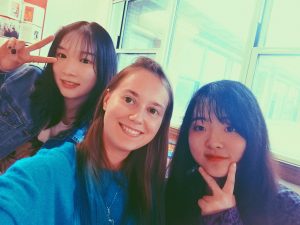International students, independent study and introversion: My UROP experience
Sabita Burke
Ever since I applied to the University of Reading and attended open days, I’ve always wanted to be a part of the undergraduate research community. The idea of getting to do real-world research in a topic I was truly interested in seemed very exciting. So, in the summer between my second and third years at university, I embarked on a UROP project.
I studied the independent learning strategies international students on a pre-sessional English course. The project’s aim was to discover the activities students were doing to learn English in their free time, and their attitudes to these strategies. I interviewed 27 students about their experience of learning English outside of class, and analysed the data qualitatively, revealing information about what resources students are finding useful. I discovered that many students favoured practical, hands-on methods of learning, such as interactive listening and reading exercises. However, students said that meeting native speakers to practise with was an enriching experience and one that boosted students’ confidence when navigating this new language. It was hoped that these findings could be used by teachers of the English course to facilitate better language learning for their future students.
The best thing about my project was hands down the opportunity to meet and talk to a large number of international students. They were from a medley of different countries, some of which I had been to, and it was exciting to talk to people from those places. It was incredibly rewarding when the students said that the interview had been a good opportunity for them to practise their English, and that they had gained a lot from it. I even exchanged contact details with some of them, and plan to meet them again in the future! Further to that, doing this research fuelled my interest in applying for a master’s degree, and gave me a wealth of essential skills needed for this.
Among the skills and knowledge I learned, one of the most useful assets I grasped was an understanding of the research environment and the essential ingredients to a good academic study. For qualitative research, this included developing an effective semi-structured interview method, and piloting it prior to data collection to ensure its suitability. Also, it is of paramount importance to keep an open mind while in the field: do not be afraid to trust your judgement and experiment with making tweaks to your design.
On top of that, while recruiting participants I also had the opportunity to speak publicly to several groups of around 200 students in their classes. For an introvert with social anxiety, this was a massive deal, and I was overjoyed that with the support I received from both teachers and students alike, the recruitment process was an enormous success!
Another invaluable aspect of the placement was the chance to work alongside specialist academics in an area of my interest. My two supervisors, Gill and Joan, were supportive throughout the six-plus weeks I was with them, and were never-failingly at hand to answer my long lists of questions. Having so much one-to-one time with academic staff is also a fantastic opportunity to pick their brains about any issues concerning you in your field of research.
Looking back, if I could do the project again I would invest more time and effort into reading into the field of learner autonomy. If I had used the initial week for background research to dig deeper into the theory and related articles, I feel as though I would have gained a richer experience of the area of foreign language learning. For students considering undergraduate research, I urge you to start strong and grab every opportunity available to you. The academic world is tough, but only if you let it be!
Even though UROP is unlike other internships in that the work is independent to the point that the vast majority of your time is spent alone in the library, being involved in this project has been an invaluable experience, and one that I would fervently recommend to anyone. Whether you are looking for something to put on your personal statement when applying for further study, want to get a head start in learning vital research skills for your dissertation, or simply want to grow your vital employability skills such as time management, organisation or communication, there’s a UROP placement out there that might be the one for you!


